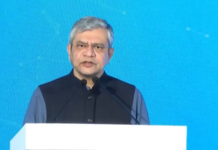
At the National Press Day celebrations organized by The Press Council of India on 16 November 2024, union information and broadcasting minister Ashwini Vaishnaw raised four key challenges in the news media landscape – fake news and disinformation; fair compensation for content creators; algorithmic bias; and, the impact of artificial intelligence on intellectual property rights.
The minister stressed the need for fair compensation for traditional content creators to address the asymmetry in bargaining power between digital platforms and conventional media. At the same time, he called for accountability in digital media to combat fake news and safeguard democracy and the need to revisit the Safe Harbor provision amid the changing media landscape and India’s diverse cultural and social context.
The Safe Harbor provision, which came into existence in the 1990s when the availability of digital media was limited to select users in universities and research institutes, provided immunity to platforms from being held accountable for user-generated content.
Globally, he said, debates are intensifying over whether the Safe Harbor provisions are still appropriate, given their role in enabling the spread of misinformation, riots, and even acts of terrorism. “Shouldn’t platforms operating in a context as complex as India adopt a different set of responsibilities? These pressing questions underline the need for a new framework that ensures accountability – and safeguards the social fabric of the nation,” he said.
The minister emphasized the need for fair compensation to traditional media outlets by digital platforms for using their content. The shift from traditional to digital media has financially impacted conventional media, which invests heavily in journalistic integrity, editorial processes, training, fact-checking, and taking responsibility for their content, he said, and highlighted the need to address the asymmetry in bargaining power between digital platforms and conventional media. “The efforts made by the conventional media in creating content needs to be fairly and suitably compensated,” he said.
The social consequences of algorithmic bias are a cause of concern, he said, adding digital media platforms must mitigate risks in a country as diverse as India. He highlighted the ethical and economic challenges of AI, calling for safeguarding the Intellectual Property Rights of creators. “Algorithms driving digital platforms prioritize content that maximizes engagement, incites strong reactions, and thereby defines the revenue for the platform. These often amplify sensational or divisive narratives,” he warned.
“AI models today can generate creative content based on vast datasets they are trained on. But what happens to the rights and recognition of the original creators who contributed to that data? Are they being compensated or acknowledged for their work?” the minister questioned. “This is not just an economic issue, it is an ethical issue too,” he added.
Highlighting India’s vibrant and diverse media ecosystem, which includes 35,000 registered newspapers, numerous news channels, and a robust digital infrastructure, Vaishnaw urged stakeholders to engage in open debates and collaborative efforts to address these challenges, transcending political differences. He emphasized the importance of preserving the media’s role as a strong pillar of democracy and building a harmonious and prosperous Viksit Bharat by 2047.
The Fair Deal impasse
While it wasn’t clear if the minister was referring to ‘Big Tech’ when he mentioned the tussle between ‘digital platforms’ versus ‘conventional media,’ the issue by itself is of immense importance to news publishers, both print and online, that have often complained of monopoly by the likes of Alphabet, which runs Google and YouTube or Meta, which operates Facebook and Instagram.
Industry bodies such as the Digital News Publishers Association (DNPA) have pointed to the imbalance in bargaining power between Big Tech and news publishers. They demand a revenue-sharing mechanism on the lines of Australia’s News Media Bargaining Code, Canada’s Online News Act, or the laws implemented in European countries such as France, which ensure that Big Tech gives a fair deal to the news publishers for the content they use.
The News Broadcasters & Digital Association, the DNPA, and the Indian Newspaper Society (INS) had filed three separate complaints against Google with the Competition Commission of India (CCI) which clubbed all the cases owing to their similar nature.
In a debate on the issue in a news channel after the minister’s comments, Aruna Sharma, former secretary, ministry of electronics and information technology (MEITY), felt India strongly needs a mandatory bargaining code on the lines of Australia or Canada or many other countries where the government has an overview, even if it doesn’t interfere, to ensure a fair commercial deal between the big tech or search engines that use the content of news media companies. This provision, she said, has been pending for long.
On the other hand, NA Nappinai, a senior advocate in the Supreme Court and an expert in cyber laws, spoke about the need to protect ownership of content generated by media houses used in social media, fair play in payment, and parity in terms of what is happening across jurisdictions, be it in Australia, Canada or India when the same companies are involved.
The bargaining code
So what is the Australia’s News Media Bargaining Code or the Canada’s Online News Act? As Indian Printer and Publisher has already reported, Australia was one of the first countries to come up with a new law requiring Facebook and Google to pay local news publishers to link their content on their news feeds or search results. The agreement was forced by the Australian Competition and Consumer Commission (ACCC) after Google and Facebook declined repeated requests to amicably negotiate with the news publishers.
Rodney Sims, ex-chairperson of the ACCC, which was instrumental in implementing the news media bargaining code, had earlier said in a virtual roundtable organized by DNPA that India could copy Australia’s model that governs commercial relationships between Australian news businesses and ‘designated’ digital platforms.

According to Sims, there are three provisions in Australia’s code – negotiation, arbitration, and collective bargaining by the players to maintain balance. As a result of its implementation – Google and Facebook had together paid more than Australian $ 200 million per year or even more to the news media organizations in that country as per previous estimates. The news companies also struck deals with the social media platform to benefit their journalists.
The Online News Act Canada requires ‘digital news intermediaries’ – essentially, Big Tech platforms – to negotiate revenue-sharing with Canadian news publishers for the use of their online news content. It was expected to give news businesses from deals under the bill “a total compensation of $329.2 million per year, media reports had earlier estimated. Just days before the Canadian law came into force, Google agreed to pay news publishers in Canada US$ 73.6 million a year or 100 million Canadian dollars to keep links to news articles in its search results.
The Act draws inspiration from Australia’s News Media Bargaining Code, particularly in its adoption of a final offer arbitration. Both the Act and the Code aim at correcting a ‘significant bargaining power imbalance’ between news businesses and tech giants by forcing negotiations on the remuneration of news content.
In India, the government had proposed regulatory interventions to force tech giants to pay news publishers a part of their revenue for using their original content, which is stuck in bureaucratic wrangles. Only time will tell when and if India succeeds in emulating Australia or Canada or if the impasse continues over a longer haul.
















